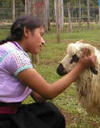LPP accredited with WIPO

The League for Pastoral Peoples and Endogenous Livestock Development (LPP) is formally accredited with the World Intellectual Property Organization, WIPO.
WIPO is the United Nations body responsible for coordinating patents, copyrights and other forms of intellectual property.
LPP member Susanne Gura attended the 9th Meeting of WIPO’s Intergovernmental Committee on Genetic Resources, Traditional Knowledge and Folklore in Geneva on 25 April.
She drew the committee’s attention to the contribution of pastoralists to developing livestock breeds, many of which have benefited the livestock industries of other countries. Patenting of breeds would impede these benefits.
“We believe that it is right to pay a good price for a good breeding animal, but it is wrong to monopolize the genes. We also believe it would be wrong to grant patents on breeding methods that are applied by most pig breeders around the globe. Patent applications on such pig breeding methods have been submitted last year in 160 countries,” she said.
“Once patents are granted, it is very costly to challenge them”, she pointed out.
Dr Gura asked the committee to consider the issue of Livestock Keepers’ Rights, as formulated by pastoralists and NGOs from around the world, and to involve pastoralists from different communities in its discussions.
Full text of Dr Gura’s statement
LPP statement to the Eighth Conference of Parties to the Convention on Biological Diversity

Livestock and livestock keepers are usually neglected during international discussions on biological diversity, which tend to focus on wildlife, wild plants and crops.
LPP is trying to attract international attention to this issue, and to the threats facing livestock breeds and the people who keep them.

Speaking on behalf of LPP, Mr Vivekanandan of SEVA, India, highlighted the need for Livestock Keepers’ Rights at an international conference on biological diversity in Curitiba, Brazil, on 22 March 2006.
Vivekanandan’s statement 17 kb
See also www.biodiv.org.
Supporting livestock keepers and breed conservation

Conference on livestock biodiversity, indigenous knowledge and and intellectual property rights, organized by the League for Pastoral Peoples in Bellagio, Italy, 27 March – 2 April 2006
Purpose
To discuss the following issues:
- How to endorse and acknowledge the role of livestock keepers in conserving diversity and ensure that their contribution to the sustainable use of animal genetic resources is rewarded and supported.
- What are the legal options for protecting animal breeding related indigenous knowledge in the context of existing legal frameworks and emerging opportunities and new models. What are the respective advantages and disadvantages?
Conclusions
The participants concluded that in the (near) future the patenting of breeding processes and individual genes may restrict the rights of the communities and individuals to breed, manage and use their own livestock as they choose. Besides impacting rural livelihoods in a negative way, this would also pose a threat to the viability and continued development of the breeds. For example, a broad patent claim recently filed in 160 countries would, if approved, restrict the rights of breeders to use commonly practised breeding techniques for pigs.
The meeting participants unanimously recommended the legal recognition of livestock keepers’ inherent rights to continue to use and develop their own breeding stock and breeding practices. National governments must recognize these rights, acknowledge livestock keepers’ contribution to national economies, and adapt their policies and legal frameworks accordingly.
Participants regarded this as an important step in preventing the current intellectual property system from being exploited for obtaining control over animal resources and breeding processes that compose a principal part of the world’s food supply.
Summary of discussions and more information
- Go to the previous page
- 1
- …
- 71
- 72
- 73
- 74
- 75
- 76
- 77
- …
- 83
- Go to the next page
